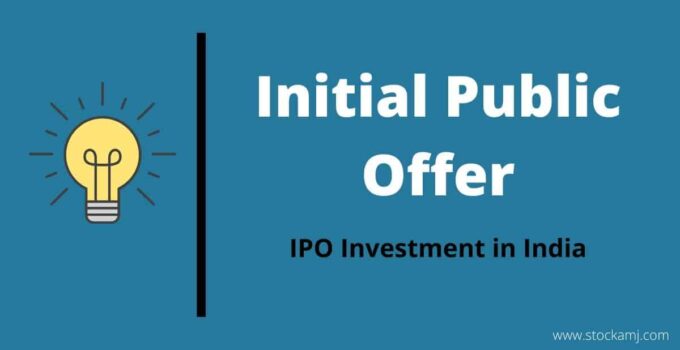Now day’s IPO investment in India is very easy and simple process. Often, you might have come across the term “IPO” on various platforms like the Internet, Newspapers and Television. Nowadays Billboards and, newspaper pages are filled with ads of “IPO”s offered by different companies.
It’s often taunted as one of the best ways to invest in the Stock Market. If you are looking for more information on IPOs, you are in the right place! Keep on reading this piece of information.
What is an IPO?
Initial Public Offering, generally understood as IPO, is a process through which a private company makes its way to the Stock Market and goes Public. Private companies are privately owned by a person or a group of people.
On the Contrary, Public companies are those whose shares are available for trading on the Stock Market. E.g., a Reliance industry is a Public Company. By offering an IPO, a privately held company sells some of its shares in the market for the first time. By doing so, they are listed on the Stock Market, and their shares can be traded regularly in the market.
Public listing offers an opportunity for the company of realizing its full financial potential.
In short, IPO is the first opportunity for a person who is looking to buy a share in any particular company.
Top 5 Reasons for Offering IPO
There can be numerous reasons that might lead a company to offer an IPO. Let’s take a look at them.

- Capital: Capital is the first and foremost requirement of any business. Companies that are looking for expansion, modernization, entering in new business domains or paying off debts and loans.
- Brand: You might have observed that every top Brand in the world is listed on the stock market. Taking a company public through IPO offering means the company grew significantly, and now it is a big brand and has a loyal customer base.
- Market Trust: Operations of Public limited companies are more transparent. Hence, they have much higher credit ratings as compared to privately-owned companies. IPO paves the way for companies to acquire raise funds and acquire loans easily.
- Future Plan: Stocks are like assets. They can be utilized in the future to acquire any other company just like money. This reason too prompts companies to go public through IPO.
- Employee Benefit: Stocks are an attractive form of liquidity. Companies offer shares to their top layered employees in the form of benefits and compensation. This can be done only after getting listed on the Stock Market.
What’s the Process of Offering an IPO?
- Before offering IPO and going Public, every company has to satisfy certain norms and regulations setups of SEC.
- Before offering IPO and going Public, every company has to satisfy certain norms and regulations setups of SEC.
- Companies have to hire an investment bank that handles the whole IPO process.
- This investment banks prepare all the legal documentation and papers related to IPO. These papers are then submitted to SEC with an underwriting agreement for the registration.
- After a thorough examination, if SEC observes that all the criteria are followed, and all necessary conditions are satisfied, it approves the IPO of that company.
IPO Investment in India – what should i do?
This is the core question from an investor’s point of view. India is growing country hence IPO investment in India is a great idea.

Generally, it is believed that the company decides to realize IPO only after thorough research and analysis of the future prospects of the business. There is a maximum possibility of gaining profit from every IPO.
Moreover, IPO offers public shares at discounted values and before the listing; they can be sold in the grey market for premium rates too. Hence, one should subscribe to every IPO.
Well, this may be true for many companies, but not for all. Certain factors should be considered before making any rash decisions in the matter of IPO.
Let’s take a look at some of the critical factors that you should look into before subscribing for any IPO.
Lock-up period
When you look at graphs of many IPOs, you may find that after initial success in the market, stocks of some companies dwindle uncontrollably. The key reason behind this downturn is the Lock-up period.
- Under rule 144 of SEC law, no Underwriter and Company insider can sell his/her shares before the “Lock-up” period expires.
- This means, once the “Lock-up” period expires, company insiders rush to sell their shares to gain maximum profit. This sudden selling-spree can easily crash the stock price.
- “Lock-up period” is between 3 to 24 months. You must have an idea about the “Lock-up Period”, and if your goal is to earn short-term profits, you should sell your shares before the “Lock-up Period” expires.
Track –record
A healthy balance sheet and good past-record are the prerequisites for any company to be successful in the stock market. It would be best if you do as much research as you can from every possible source about a company before subscribing for its IPO. Certain information is available in its prospectus itself. You should study it properly before taking any decision.
Underwriters
Underwriters are the most crucial organ of the IPO process. They are the investment bank that issues securities for raising new investments. Unfortunately, numerous investment banks are ready to offer underwriting to any companies for making some quick bucks. This can be a disaster for investors. So always go for an IPO that has substantial backing from Big Brokerage firms.
Big brokerage firms do a thorough analysis of the company before offering any underwriting. Such big companies ensure investors don’t lose their money on poor-quality IPOs.
Also Read: What is IPO Grey Market?
Flipping
- It’s a process of selling shares in the initial days that are acquired through IPO subscription. Flipping is frequent in the cases when the stock sky-rockets after getting listed on the market. Subscribers start flipping to gain maximum and quick returns on their investment.
- One thing that should always be kept in mind that investment in IPO is similar to the investment in the equity market. Both of them carry the same risk and reward relationship.
- Whether you gain profit or lose money entirely depends on the company. So it’s better to choose the IPO after detailed analysis.
- Analysis and research for the best IPO can be a complicated task. So, it’s advisable to consult a wealth planner or certified Broking firm before investing.
For more information on IPO, you can visit (www.moneycontrol.com)
More Article on IPO




